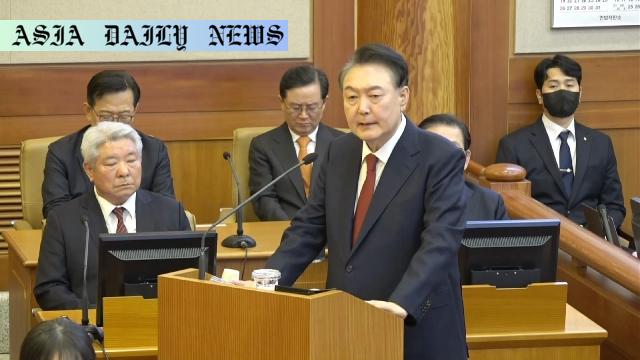Impeachment: South Korea awaits Constitutional Court ruling on President Yoon’s fate following intense impeachment trial debate.
- The Constitutional Court’s impeachment ruling on President Yoon is expected by mid-March.
- Opposition accuses Yoon of threatening democracy with martial law in December.
- Yoon defends his actions as necessary for national security and proposes political reforms if reinstated.

The Context of President Yoon’s Impeachment
The impeachment trial of South Korean President Yoon Suk-yeol has gripped the nation over the past several weeks. At the center of the proceedings lies Yoon’s controversial decision to impose martial law in December, which he justified by citing a national crisis. His governance approach has come under fire, with claims from opposition parties that his actions undermine the very Constitution and democratic principles he swore to uphold. Public discourse around this case has highlighted deep ideological rifts within South Korea’s political landscape.
The Accusations from the Opposition
Jung Chung-rai, representing the opposition Democratic Party, has been vocal in condemning Yoon’s actions. Leading the impeachment panel of the National Assembly, Jung explicitly labeled the president’s conduct as a betrayal of public trust. The opposition argues that martial law was not only unnecessary but also a grave overreach that threatened the democratic fabric of the country. This bold stance has rallied significant political and public interest in the trial.
President Yoon’s Defense
In his statements to the Constitutional Court, President Yoon ardently defended the legitimacy of his actions. He described the imposition of martial law as a necessary measure to confront and alert the nation to a pressing crisis. Yoon positioned his actions as an appeal to citizens to collectively address the challenges facing South Korea, rather than a unilateral decision that bypassed constitutional checks and balances.
Proposal of Reforms If Reinstated
In an effort to regain public trust, Yoon has proposed a shift in his governance strategy if reinstated. He has indicated plans to concentrate on foreign relations while delegating a substantial portion of domestic affairs to the prime minister. Additionally, the president has expressed a commitment to pushing forward constitutional revisions and political reforms, highlighting a willingness to respond to criticisms of his leadership style.
Public and Media Reactions
The impeachment trial has galvanized national debate, with South Korean media closely covering every development. Citizens and observers have expressed mixed reactions ranging from support for democratic accountability to concerns about the precedent this trial sets for future administrations. The trial’s outcome could significantly influence public trust in South Korea’s political institutions and leadership stability.
The Imminent Verdict
The Constitutional Court’s ruling, expected by mid-March, is set to either uphold or dismiss Yoon’s impeachment. A decision to remove President Yoon could mark a consequential moment in South Korea’s modern political history, potentially reshaping the country’s approach to executive accountability. Conversely, if the court dismisses the impeachment, the president’s administration could face an uphill battle in restoring public faith and progressing critical initiatives.
Potential Implications for South Korea
The outcome of this case has far-reaching implications not only for the political landscape but also for South Korea’s international reputation. A strengthened commitment to democracy could bolster global perceptions of the nation as a stable and transparent political entity. However, prolonged instability arising from the court’s decision could delay key policy implementations and hinder diplomatic momentum.
Conclusion
The trial and the forthcoming verdict highlight the complexities of balancing national leadership responsibilities with constitutional fidelity. No matter the outcome, this moment serves as a crucial test of South Korea’s dedication to its democratic principles and governance structures. The coming weeks will undoubtedly shape the nation’s political trajectory for years to come.



Commentary
Reflections on the Trial
South Korea’s impeachment proceedings against President Yoon Suk-yeol signal one of the most critical junctures in the nation’s democratic history. At its essence, the trial is not solely about the president’s actions but about ensuring that public officials abide by their constitutional mandates. By moving forward with impeachment, South Korea sets a powerful precedent for holding leaders accountable, underscoring the strength of its institutions.
Challenges of Governance and Crisis
Leadership during a national crisis is inherently challenging, as decisions often have to balance immediate risks against long-term implications. Yoon’s defense suggests that his martial law decree was aimed at prioritizing national security; however, the tools of democracy must be preserved even in the face of adversity. His admission to shifting domestic authority to the prime minister, if reinstated, can be interpreted as an effort to diffuse criticism. Whether this move restores public trust remains to be seen.
The Role of Public Perception
Public confidence in democratic systems is as vital as the systems themselves. It is commendable to see South Korea’s citizens and opposition leaders engaging deeply with this process, as active political participation fosters accountability. However, this trial also shines a light on political polarization that could weaken collective progress. Leaders across parties must use this moment as an opportunity to bridge divides and inspire unity in vision and governance.
Looking Ahead
The Constitutional Court’s forthcoming ruling holds immense weight not only as a judgment for President Yoon but as a testament to the strength of South Korea’s democracy. Regardless of the outcome, the nation must prioritize healing internal divisions and reinforcing democratic norms. These efforts will ensure that South Korea continues to thrive as a global leader in accountability and governance.